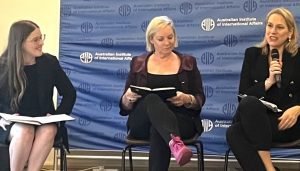On Thursday 10 October, the Australian Institute of International Affairs NSW hosted a Careers Evening where successful professionals discussed their experiences in international careers. The panel comprised former Australian Ambassador Jane Hardy, NSW Consul General of Ireland Rosie Keane and Dr John Lee from the Center for International Security Studies at the University of Sydney. The event was moderated by AIIA NSW Councilor Alice Nason. The speakers outlined their careers in foreign affairs and international policy advice.
Jane Hardy (centre) reflects on her recruitment to the Department of Foreign Affairs and Trade (DFAT) and her career overseas and in Canberra. She emphasized the importance of working on well-read policies in international affairs, including academic theory and the work of think tanks. She contrasted her experience in small embassies when she was ambassador to Spain and Andorra with her time in Washington. The embassy was large enough to resemble a government department in Canberra, and housed 17 Commonwealth agencies. The embassy’s activities were similar to those of the vast number of lobbyists operating in Washington.
Jane also described her day-to-day work at the Foreign Office, including preparing policy submissions (or recommendations) to ministers. She suggested that diplomatic analysis and negotiation demonstrate the power of the pen. She believed that integrity, adaptability to new places and new technologies, and hard work were important factors for a career as a diplomat.
Rosie Keene (centre) talks about the leap she made when she was recruited from the world of finance to become a diplomat. She noted the increasingly diverse experience of diplomatic service, including higher levels of LGBTQI+ participation, and emphasized the need to be true representatives of one’s country and society. She compared her job in Sydney to being a diplomat.
There are special stresses and uncertainties during the corona period and having a representative in another country. She commented that as a diplomat, she has to cover a wide range of diverse issues that are often unfamiliar and sometimes uncomfortable. Therefore, she emphasized the need for adaptability and tolerance to new developments. World events influence government priorities. Examples include his role at the Irish Embassy in London in advising on Ireland’s response to Brexit, and his unexpected first appointment to the Department of Disarmament and Non-Proliferation despite his finance background. She noted that courage and flexibility are important traits for diplomats dealing with new and complex challenges.
John Lee (right) spoke about his long career in business, his educational background, which included studying at Oxford University, and his two-and-a-half year stint as an adviser to former Foreign Secretary Julie Bishop. He compared and contrasted business life and government policy advice, including issues of job security, career structure, and hierarchy. Policy and business issues were not that different. An important starting point in any analysis is to ask why the problem occurred in order to address how to solve it. John commented on the importance of staying ahead of international political and economic changes and recognizing the need to consider alignment with majority opinion and analysis. He also emphasized the need to challenge prevailing trends and think independently, advising people not to get caught up in intellectual fads. Instead, he encouraged professionals to anticipate change and cultivate original ideas.
Looking to the future, speakers commented on the growing problem of both misinformation and disinformation and the activities of malicious actors. A global response was needed to the challenges posed by artificial intelligence and the potential for new international diseases.

